Syllabus Overview
- People
- Process
- Business Environment
General Details
As the world’s leading authority on project management, PMI created PMP Certification to recognize project managers who have proven they have skills to successfully manage projects. Project Management Professional (PMP)® certification represents an elite group of project managers. It proves project leadership experience and expertise in any way of working.
To obtain PMP certification, a project manager must meet certain requirements and then pass a 180-question exam. The PMP exam was created by project leaders for project leaders, so each test questions can be related to real-life project management experience.
PMP certification validates that you are highly skilled in:
People: Recognizing you have the skills to effectively lead and motivate a project team throughout a project.
Process: Using predictive, agile and hybrid approaches to determine which way of working is best for each project.
Business Environment: Highlighting the success of a project and its impact on overall strategic organizational goals.
What can PMP certification do for you?
Learn why the PMP is a stand-out solution to set you apart in our current world of work.
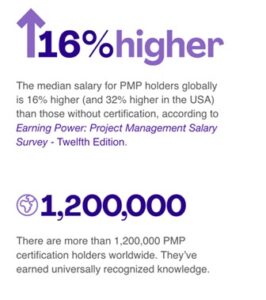
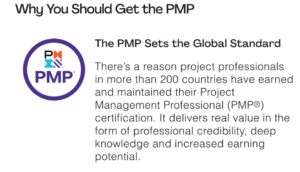
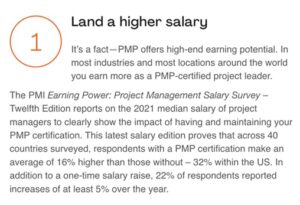
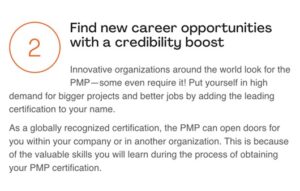
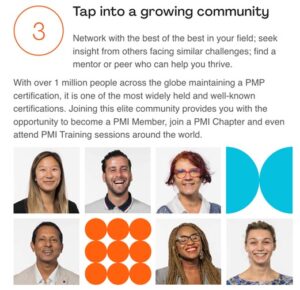
To be eligible for the PMP certification, you must meet certain educational and professional experience requirements. All project management experience must have been accrued within the last eight consecutive years prior to your application submission.
Educational Background
– Secondary degree (high school diploma, associate’s degree or global equivalent)
– Four-year degree (bachelor’sdegree or global equivalent)
– Bachelor’s or post-graduate degree from a GAC accredited program *(bachelor’s degree or master’s or global equivalent)
Project Management Experience
– Minimum five years/60 months unique non-overlapping professional project management experience
– Minimum three years/36 months unique non-overlapping professional project management experience
– Minimum two years/24 months unique non-overlapping professional project
management experience
-
- Silver Learning Partner of IMA & ACCA and approved partner of Hock International.
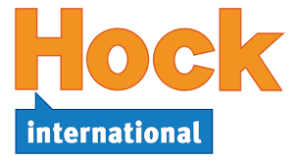

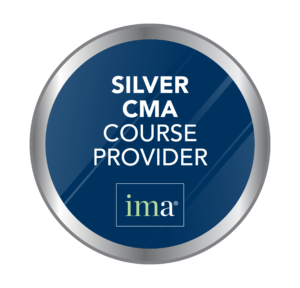
- Expert teaching faculty.
- Offers original Hock International standard review study material.
- Exclusive 50% discount on IMA Membership/Entrance fees and 29% discount on CMA Exam fees.
- Weekend classes making it flexible for working professionals in the Middle East
- Assistance will be provided in planning a study schedule.
- Weekly assignments to help the student maintain a firm grip over the subject.
- Two mock exams per part.
- Short notes prepared by the teacher will be shared after each session.
- Video recordings of every live session will be shared with the students
- We strictly monitor the attendance of students and ensure reaching out to the absentees.
- Bradford offers complete guidance through registration with IMA for exams and obtaining the certification.
Rita Mulcuphy’s PMP exam prep (International best-selling PMP exam prep resource)
Features of this worldwide best-selling resource include the following:
• Users will be able to try one full 180-question exam simulation and up to 8 smaller focused tests
• More than 400 exercises and practice questions throughout the book
• A focus on what you really need to know to pass the exam
• Exclusive Tricks of the Trade®
• Proven study techniques
• A straightforward approach to complex material
• Agile content to improve understanding
Exam
The PMP examination is comprised of 180 questions. Of the 180 questions, 5 are considered pretest questions. Pretest questions do not affect the score and are used in examinations as an effective and legitimate way to test the validity of future examination questions. All questions are randomly placedthroughout the examination.
Syllabus
Domain I People—42%
Task 1 Manage conflict
• Interpret the source and stage of the conflict
• Analyze the context for the conflict
• Evaluate/recommend/reconcile the appropriate conflict resolution solution
Task 2 Lead a team
• Set a clear vision and mission
• Support diversity and inclusion (e.g., behavior types, thought process)
• Value servant leadership (e.g., relate the tenets of servant leadership to the team)
• Determine an appropriate leadership style (e.g., directive, collaborative)
• Inspire, motivate, and influence team members/stakeholders (e.g., team contract,
social contract, reward system)
• Analyze team members and stakeholders’ influence
• Distinguish various options to lead various team members and stakeholders
Task 3 Support team performance
• Appraise team member performance against key performance indicators
• Support and recognize team member growth and development
• Determine appropriate feedback approach
• Verify performance improvements
Task 4 Empower team members and stakeholders
• Organize around team strengths
• Support team task accountability
• Evaluate demonstration of task accountability
• Determine and bestow level(s) of decision-making authority
Task 5 Ensure team members/stakeholders are adequately trained
• Determine required competencies and elements of training
• Determine training options based on training needs
• Allocate resources for training
• Measure training outcomes
Task 6 Build a team
• Appraise stakeholder skills
• Deduce project resource requirements
• Continuously assess and refresh team skills to meet project needs
• Maintain team and knowledge transfer
Task 7 Address and remove impediments, obstacles, and blockers for the team
• Determine critical impediments, obstacles, and blockers for the team
• Prioritize critical impediments, obstacles, and blockers for the team
• Use network to implement solutions to remove impediments, obstacles, and
blockers for the team
• Re-assess continually to ensure impediments, obstacles, and blockers for the team
are being addressed
Task 8 Negotiate project agreements
• Analyze the bounds of the negotiations for agreement
• Assess priorities and determine ultimate objective(s)
• Verify objective(s) of the project agreement is met
• Participate in agreement negotiations
• Determine a negotiation strategy
Task 9 Collaborate with stakeholders
• Evaluate engagement needs for stakeholders
• Optimize alignment between stakeholder needs, expectations, and project
objectives
• Build trust and influence stakeholders to accomplish project objectives
Task 10 Build shared understanding
• Break down situation to identify the root cause of a misunderstanding
• Survey all necessary parties to reach consensus
• Support outcome of parties’ agreement
• Investigate potential misunderstandings
Task 11 Engage and support virtual teams
• Examine virtual team member needs (e.g., environment, geography, culture,
global, etc.)
• Investigate alternatives (e.g., communication tools, colocation) for virtual team
member engagement
• Implement options for virtual team member engagement
• Continually evaluate effectiveness of virtual team member engagement
Task 12 Define team ground rules
• Communicate organizational principles with team and external stakeholders
• Establish an environment that fosters adherence to the ground rules
• Manage and rectify ground rule violations
Task 13 Mentor relevant stakeholders
• Allocate the time to mentoring
• Recognize and act on mentoring opportunities
Task 14 Promote team performance through the application of emotional intelligence
• Assess behavior through the use of personality indicators
• Analyze personality indicators and adjust to the emotional needs of key project stakeholders
Domain II Process—50%
Task 1 Execute project with the urgency required to deliver business value
• Assess opportunities to deliver value incrementally
• Examine the business value throughout the project
• Support the team to subdivide project tasks as necessary to find the minimum
viable product
Task 2 Manage communications
• Analyze communication needs of all stakeholders
• Determine communication methods, channels, frequency, and level of detail for all
stakeholders
• Communicate project information and updates effectively
• Confirm communication is understood and feedback is received
Task 3 Assess and manage risks
• Determine risk management options
• Iteratively assess and prioritize risks
Task 4 Engage stakeholders
• Analyze stakeholders (e.g., power interest grid, influence, impact)
• Categorize stakeholders
• Engage stakeholders by category
• Develop, execute, and validate a strategy for stakeholder engagement
Task 5 Plan and manage budget and resources
• Estimate budgetary needs based on the scope of the project and lessons learned
from past projects
• Anticipate future budget challenges
• Monitor budget variations and work with governance process to adjust as
necessary
• Plan and manage resources
Task 6 Plan and manage schedule
• Estimate project tasks (milestones, dependencies, story points)
• Utilize benchmarks and historical data
• Prepare schedule based on methodology
• Measure ongoing progress based on methodology
• Modify schedule, as needed, based on methodology
• Coordinate with other projects and other operations
Task 7 Plan and manage quality of products/deliverables
• Determine quality standard required for project deliverables
• Recommend options for improvement based on quality gaps
• Continually survey project deliverable quality
Task 8 Plan and manage scope
• Determine and prioritize requirements
• Break down scope (e.g., WBS, backlog)
• Monitor and validate scope
Task 9 Integrate project planning activities
• Consolidate the project/phase plans
• Assess consolidated project plans for dependencies, gaps, and continued business
value
• Analyze the data collected
• Collect and analyze data to make informed project decisions
• Determine critical information requirements
Task 10 Manage project changes
• Anticipate and embrace the need for change (e.g., follow change management
practices)
• Determine strategy to handle change
• Execute change management strategy according to the methodology
• Determine a change response to move the project forward
Task 11 Plan and manage procurement
• Define resource requirements and needs
• Communicate resource requirements
• Manage suppliers/contracts
• Plan and manage procurement strategy
• Develop a delivery solution
Task 12 Manage project artifacts
• Determine the requirements (what, when, where, who, etc.) for managing the
project artifacts
• Validate that the project information is kept up to date (i.e., version control) and
accessible to all stakeholders
• Continually assess the effectiveness of the management of the project artifacts
Task 13 Determine appropriate project methodology/methods and practices
• Assess project needs, complexity, and magnitude
• Recommend project execution strategy (e.g., contracting, finance)
• Recommend a project methodology/approach (i.e., predictive, agile, hybrid)
• Use iterative, incremental practices throughout the project life cycle (e.g., lessons
learned, stakeholder engagement, risk)
Task 14 Establish project governance structure
• Determine appropriate governance for a project (e.g., replicate organizational
governance)
• Define escalation paths and thresholds
Task 15 Manage project issues
• Recognize when a risk becomes an issue
• Attack the issue with the optimal action to achieve project success
• Collaborate with relevant stakeholders on the approach to resolve the issues
Task 16 Ensure knowledge transfer for project continuity
• Discuss project responsibilities within team
• Outline expectations for working environment
• Confirm approach for knowledge transfers
Task 17 Plan and manage project/phase closure or transitions
• Determine criteria to successfully close the project or phase
• Validate readiness for transition (e.g., to operations team or next phase)
• Conclude activities to close out project or phase e (e.g., final lessons learned, retrospective, procurement, financials, resources)
Domain III Business Environment—8%
Task 1 Plan and manage project compliance
• Confirm project compliance requirements (e.g., security, health and safety,
regulatory compliance)
• Classify compliance categories
• Determine potential threats to compliance
• Use methods to support compliance
• Analyze the consequences of noncompliance
• Determine necessary approach and action to address compliance needs (e.g.,
risk, legal)
• Measure the extent to which the project is in compliance
Task 2 Evaluate and deliver project benefits and value
• Investigate that benefits are identified
• Document agreement on ownership for ongoing benefit realization
• Verify measurement system is in place to track benefits
• Evaluate delivery options to demonstrate value
• Appraise stakeholders of value gain progress
Task 3 Evaluate and address external business environment changes for impact on
scope
• Survey changes to external business environment (e.g., regulations, technology,
geopolitical, market)
• Assess and prioritize impact on project scope/backlog based on changes in
external business environment
• Recommend options for scope/backlog changes (e.g., schedule, cost changes)
• Continually review external business environment for impacts on project
scope/backlog
Task 4 Support organizational change
• Assess organizational culture
• Evaluate impact of organizational change to project and determine required
actions
• Evaluate impact of the project to the organization and determine required actions
Member – US$405
Non-Member -US$555
About the instructor
Ms. Neethu
PMI Certified Authorised Trainer Partner Instructor MBA, PMP®, PMI-ACP® , PMI-RMP® , PRINCE2® Practitioner ,SMC
Accomplish trainer, consultant and Project Management Expert. She has over 18 years of Project delivery experience and worked in various roles of Program Manager, Project Manager, Business Analyst and Technical Project Leader. Neetu is a certified PMP®, PMI-RMP® and PMI-ACP® from Project Management Institute (PMI®). She has been in Gulf region since 2008 and conducted several trainings on Project Management and workshops across enterprise and government organizations and trained a great number of executives. Neetu has both practical and academic knowledge of various aspects of project management, and it would be a fantastic opportunity for students to learn the PMP course from such knowledgeable instructors

